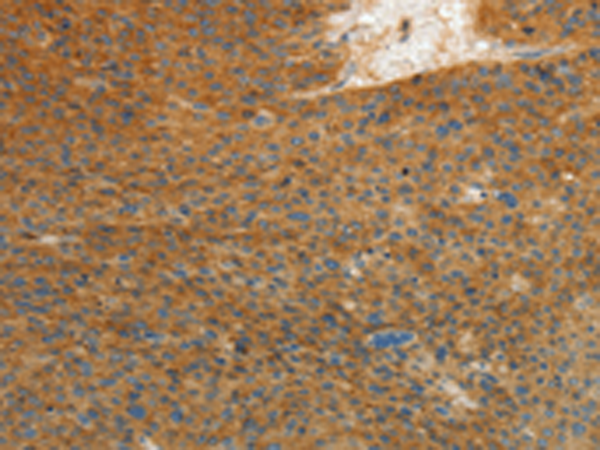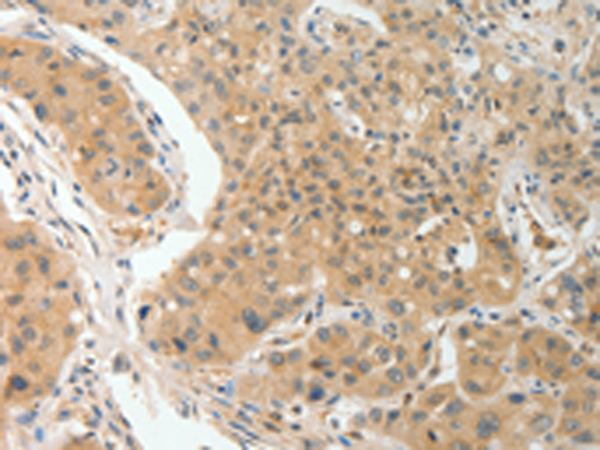


| WB | 咨询技术 | Human,Mouse,Rat |
| IF | 1/20-1/50 | Human,Mouse,Rat |
| IHC | IHC:1/100-1/200;IHF:1/50-1/200 | Human,Mouse,Rat |
| ICC | 1/50-1/200 | Human,Mouse,Rat |
| FCM | 1/20-1/100 | Human,Mouse,Rat |
| Elisa | 咨询技术 | Human,Mouse,Rat |
| Aliases | AAG6; PKCA; PRKACA; PKC-alpha |
| WB Predicted band size | 77 kDa |
| Host/Isotype | Rabbit IgG |
| Antibody Type | Primary antibody |
| Storage | Store at 4°C short term. Aliquot and store at -20°C long term. Avoid freeze/thaw cycles. |
| Species Reactivity | Human, Mouse, Rat |
| Immunogen | Fusion protein of human PRKCA |
| Formulation | Purified antibody in PBS with 0.05% sodium azide and 50% glycerol. |
+ +
以下是与AKT1/2/3抗体相关的3篇参考文献,涵盖抗体开发、特异性验证及在疾病研究中的应用:
---
1. **文献名称**:*AKT1 E17K in human cancers: A frequent mutation that modulates oncogenic signaling*
**作者**:Carpten, J.D., et al. (2007)
**摘要**:该研究开发了针对AKT1的特异性抗体,通过免疫印迹和免疫组化验证其在乳腺癌、结直肠癌等组织中的表达。研究发现AKT1的E17K突变与肿瘤发生相关,并强调所用抗体可区分AKT1与其他亚型(AKT2/3),为突变分析提供可靠工具。
2. **文献名称**:*Amplification of AKT2 in human pancreatic cancer cells and inhibition of AKT2 expression and tumorigenicity by antisense RNA*
**作者**:Cheng, J.Q., et al. (1996)
**摘要**:研究利用AKT2特异性抗体检测其在卵巢癌和胰腺癌细胞中的表达,发现AKT2基因扩增与肿瘤侵袭性相关。通过Western blot和免疫沉淀验证抗体特异性,并证实敲低AKT2可抑制肿瘤生长,凸显抗体在功能研究中的关键作用。
3. **文献名称**:*Comparative analysis of AKT isoform expression and activation in neuroblastoma*
**作者**:Easton, R.M., et al. (2005)
**摘要**:该研究系统比较了AKT1、AKT2和AKT3抗体在神经母细胞瘤中的特异性,结合siRNA敲除实验验证抗体可靠性。结果显示,AKT3在转移性肿瘤中高表达,提示其作为治疗靶点的潜力,并强调选用高特异性抗体对亚型分型的重要性。
---
以上文献均聚焦AKT抗体开发与验证,涉及癌症机制研究,为靶向治疗提供实验依据。如需扩展,建议检索抗体技术平台(如Cell Signaling Technology)提供的验证数据或商用抗体说明书。
The AKT (protein kinase B) family comprises three highly conserved serine/threonine kinases—AKT1. AKT2. and AKT3—encoded by distinct genes. These isoforms play critical roles in the PI3K/AKT/mTOR signaling pathway, regulating cell survival, proliferation, metabolism, and apoptosis. AKT1 is ubiquitously expressed and linked to cancer progression, while AKT2 is predominant in insulin-sensitive tissues (e.g., adipose, muscle) and associated with glucose metabolism and diabetes. AKT3. primarily expressed in the brain and testes, influences neuronal development and synaptic plasticity. Dysregulation of AKT signaling is implicated in cancers, metabolic disorders, and neurological diseases.
Antibodies targeting AKT isoforms are essential tools for detecting protein expression, activation (via phosphorylation at specific residues like Thr308/Ser473), and subcellular localization. They are widely used in techniques such as Western blotting, immunohistochemistry (IHC), and immunofluorescence (IF). Due to the high sequence homology (~80%) among isoforms, antibody specificity is critical to avoid cross-reactivity. For example, phosphorylation-specific antibodies distinguish activated AKT (e.g., p-AKT Ser473) from its inactive form. Researchers must validate antibodies using isoform-specific knockout cell lines or tissues to ensure accuracy. These antibodies are pivotal in studying AKT's role in disease mechanisms, drug development (e.g., AKT inhibitors in cancer therapy), and biomarker discovery. Their application spans basic research, clinical diagnostics, and therapeutic monitoring.
×